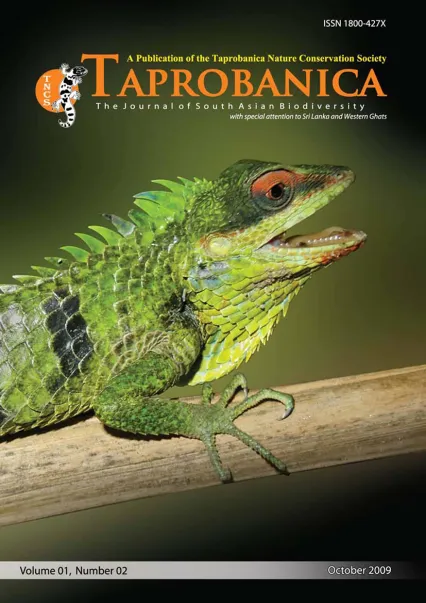

v1i2.22
Volume 1 | Number 2 | November 2009
Short Note
ISSN: 1800-427X (print)
eISSN: 1800-427X (online)
DOI:10.47605/tapro.v1i2.22
Submitted date: 30 August 2009
Accepted date: 12 October 2009
Published date: 22 November 2009
Pp. 135–136.
COMMON SKINK Eutropis carinata (REPTILIA : SCINCIDAE) FEED ON ENDEMIC SEMI-SLUG Ratnadvipia irradians (LIMACOIDEA : ARIOPHANTIDAE)
D.M.S. Suranjan Karunarathna & A.A. Thasun Amarasinghe*
*Corresponding author. E-mail: thasun.taprobanica@gmail.com
The skinks belong to the genus Eutropis is widely distributed in South and South East Asia and is represented in Sri Lanka by seven species, the largest and the most common of which is common skink Eutropis carinata (Schneider, 1801). In Sri Lanka E. carinata is widely distributed in open areas, closed canopy forest, home gardens and plantations in wet and dry zones below 1,000 m altitude. The Sri Lankan endemic semi-slug genus Ratnadvipia consists of two species, Ratnadvipia irradians (Pfeiffer, 1853) and Ratnadvipia karui Raheem & Naggs, 2006. Ratnadvipia is almost exclusively confined to the tropical lowland rain forests, intermediate zone and up to the suitable habitats within the dry zone. Although snails are usually not an item of skink diet, we have observed a semi-slug in E. carinata gut.
Section Editor: Sujan Henkanaththegedara
eISSN: 1800-427X (online)
DOI:10.47605/tapro.v1i2.22
Submitted date: 30 August 2009
Accepted date: 12 October 2009
Published date: 22 November 2009
Pp. 135–136.
COMMON SKINK Eutropis carinata (REPTILIA : SCINCIDAE) FEED ON ENDEMIC SEMI-SLUG Ratnadvipia irradians (LIMACOIDEA : ARIOPHANTIDAE)
D.M.S. Suranjan Karunarathna & A.A. Thasun Amarasinghe*
*Corresponding author. E-mail: thasun.taprobanica@gmail.com
The skinks belong to the genus Eutropis is widely distributed in South and South East Asia and is represented in Sri Lanka by seven species, the largest and the most common of which is common skink Eutropis carinata (Schneider, 1801). In Sri Lanka E. carinata is widely distributed in open areas, closed canopy forest, home gardens and plantations in wet and dry zones below 1,000 m altitude. The Sri Lankan endemic semi-slug genus Ratnadvipia consists of two species, Ratnadvipia irradians (Pfeiffer, 1853) and Ratnadvipia karui Raheem & Naggs, 2006. Ratnadvipia is almost exclusively confined to the tropical lowland rain forests, intermediate zone and up to the suitable habitats within the dry zone. Although snails are usually not an item of skink diet, we have observed a semi-slug in E. carinata gut.
Section Editor: Sujan Henkanaththegedara
- List of Articles & Contents





